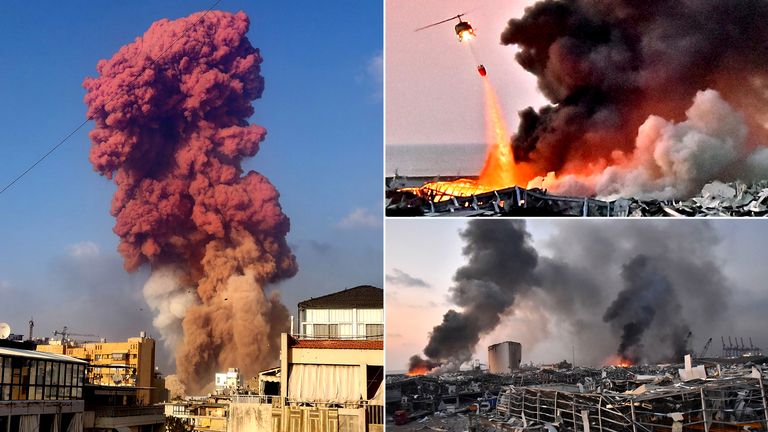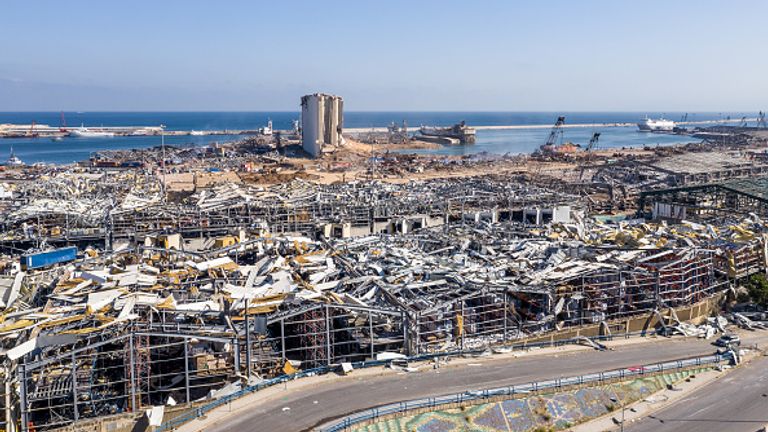Hezbollah's Rule of Lebanon : The Ruination of Lebanon
"People think that Hezbollah knows everything that goes on in the Beirut port." "Hezbollah does not run or control Beirut's port and does not interfere with it." Hezbollah leader Hassan Nasrallah
"On a scale, this explosion is scaled down from a nuclear bomb rather than up from a conventional bomb." "This is huge." Roland Alford, managing director, Alford Technologies British explosive ordnance disposal firm
 |
| The explosion killed at least 154 people. Pics: Talal Traboulsi/Reuters/TR/AFP/Getty |
An immense storage of ammonium nitrate, 2,750 tonnes-worth stored in a warehouse. Material, though with an agricultural component, also used in explosives. By coincidence the very material most favoured for its explosive capacity by Hezbollah. The crew that manned the rickety old cargo vessel that took haven in Beirut's port because of structure problems with the ship feared the cargo, knowing its potential. Dock personnel, looking askance at its six years of storage on the dock knew they were living and working around a ticking time bomb.
Dock managers had repeatedly written to the government agencies that might have taken action to remove the material, but to no avail, despite warning of its potentially combustible nature. Clearly, it was in someone's interests to store the material and to maintain its presence in a vulnerable area of the city. Just as clearly, the massive disinterest by the ruling elite in the fact that this highly flammable substance could have the potential to create an immense explosion speaks to massive ignorance and corruption.
Or unease and fear over confronting that portion of government controlled by Hezbollah over the flash-back that might be occasioned. In a country now held in majority thrall to an Islamist terrorist group held to be such by other Middle East countries as well as Western governments. So powerful that they maintain their own militias separate and apart from Lebanon's traditional military apparatus. Militias that relentlessly stockpile munitions, rockets, missiles for the eventual challenge to Israel's existence, manipulated largely by the Islamic Republic of Iran, for Hezbollah is Iran's creature.
 |
| About 2,750 tonnes of ammonium nitrate detonated in the explosion, an impact that experts equated to a minor earthquake. (CBC News) |
Beside the warehouse housing the ammonium nitrate, stood another warehouse where fireworks were stored. Close by those two warehouses were giant silos storing the nation's wheat supply. A supply for which Lebanon must provision itself to feed its population of six million and the additional million Syrian refugees that harbour for shelter within the country bordering Syria where Hezbollah has helped create those refugees, fighting alongside a Shitte Alawite regime that uses barrel bombs and weaponizes chemicals to cancel out its rebellious Syrian Sunni citizens.
When the dual explosions in the warehouse containing the ammonium nitrate exploded those silos were destroyed, and the wheat contained in them scattered to the winds and the Mediterranean along with tens of thousands of people whose whereabouts are being sought, as missing casualties of the blasts. The Lebanese government explained that welding work in the firework storage warehouse was likely responsible for the sparks that set off the ammonium nitrate.
Lebanese citizens are beyond shocked and furious, demanding the departure of their entire government apparatus. Not our fault, their leaders said, they had no idea the chemical was stored on the dock area. However, there must be someone who is guilty of the oversight to safety and stability and it must be the dock managers, speedily arrested and held in custody. The same dock managers who have attempted fruitlessly for years, to alert their government, appealing that the chemicals be removed.
 |
| The explosion killed an estimated 154 people and injured move than 5000 |
The people of Lebanon have not been appeased by their government's contrite and innocent reaction to a catastrophe that has killed so many, injured so many more, leaving a quarter of a million Beirut residents homeless. Coping with the COVID pandemic, with dire economic straits, with food shortages and fears of poverty and privation, this disaster proved to be one too many for any population to live with. A diversion was obviously required to incite people to turn their rage elsewhere.
And that elsewhere can be guessed at. Suddenly it occurred to the ruling elite that what triggered off the explosions could have been an attack, a bomb from some outside force. A foreign enemy known to be hostile to the country, with an agenda of its own, counter to Iran, Syria and Hezbollah must have been involved. Convenient and useful to divert rage in a direction that would exonerate Lebanon's rulers, those who truly govern a now-collapsed nation.
 |
The investigation into the massive explosion at Beirut's port is looking at the warehouse that had held 2,750 tons of ammonium nitrate. Anwar Amro/AFP via Getty Images |
The civil war that tore Lebanon apart between 1975 and 1990 has never dissipated. As divisive as the Sunni, Shia, Christian and Druze alongside a Palestinian 'refugee' presence became then, when tribal and sectarian antipathies led to unspeakable violence and death, it lingers. In the 1980s when the UN arranged for peacekeepers to arrive, they were American and French military. And this was when Hezbollah, the Party of God made its debut on the world stage.
Two 'suicide' truck bombs went into action in 1983, blasting apart the U.S. marine barracks with all the efficiency that ammonium nitrate affords. French and American diplomats in Beirut were attacked when the U.S. embassy was bombed. In 1983, about 300 people lost their lives to Hezbollah's ammonium nitrate command performances. The rest is history.
Labels: Hezbollah, Hezbollah Armaments, Lebanon
0 Comments:
Post a Comment
<< Home